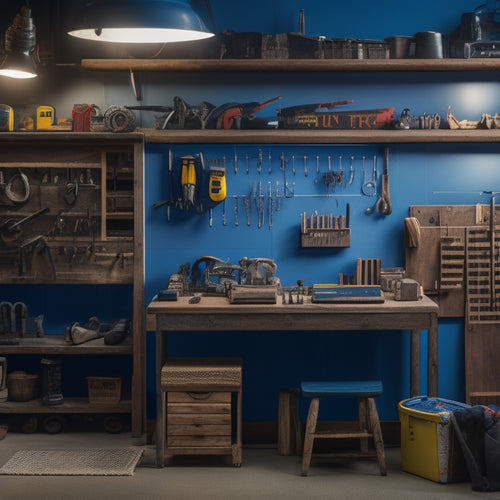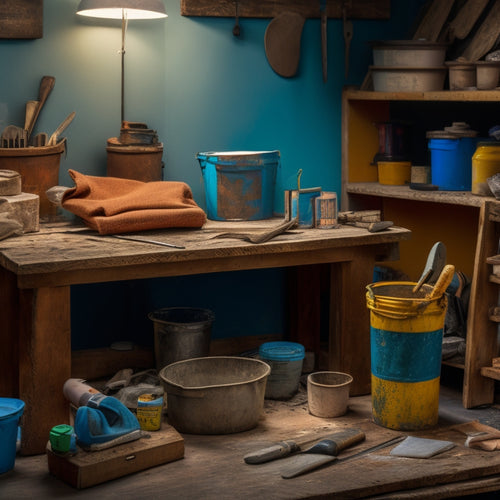
Why Choose Concrete for Your Dream Home Renovation
Share
When renovating your dream home, concrete emerges as a premier choice due to its unparalleled combination of durability, versatility, energy efficiency, and cost savings. You'll appreciate its ability to withstand extreme weather conditions, require minimal maintenance, and provide a comfortable living space. With concrete, you can create unique designs, from modern and sleek to organic and industrial-chic, while enjoying significant energy savings through its thermal mass properties. As you explore the benefits of concrete, you'll discover how it can elevate your dream home's value, making it a smart investment for years to come, and uncovering more advantages that will leave you convinced.
Key Takeaways
• Concrete structures offer exceptional durability, lasting for decades and even centuries with minimal maintenance required.
• Its versatility in design options allows for unique forms, textures, and patterns, enhancing visual interest and aesthetic appeal.
• Concrete's thermal mass properties and high-density structure provide excellent insulation, regulating indoor temperature and reducing energy bills.
• Its impermeable surface resists damage from weathering, erosion, and pests, reducing repair frequency and maintenance costs.
• Renovating with concrete can significantly increase property value, yielding strong returns on investment and supporting long-term appreciation.
Durability of Concrete Structures
When you construct a concrete structure for your home renovation, you can expect it to last for decades, with some concrete buildings standing the test of time for centuries, thanks to its remarkable durability.
Concrete's exceptional weather resistance is a significant contributor to its longevity. It can withstand harsh environmental conditions, including extreme temperatures, heavy rainfall, and intense sunlight, without compromising its structural integrity.
Furthermore, concrete structures have excellent seismic performance, making them ideal for regions prone to earthquakes. The material's high compressive strength and ductility enable it to absorb and distribute seismic forces, reducing the risk of damage or collapse.
As a result, you can have peace of mind knowing that your concrete structure can resist natural disasters and continue to provide a safe and comfortable living space for years to come.
Versatility in Design Options
You can shape concrete into a vast array of forms and structures, allowing you to release your creativity and bring your unique design vision to life. With its incredible versatility, concrete can be molded, poured, and finished to achieve any aesthetic you desire. From sleek and modern to rustic and traditional, concrete can be transformed to fit your style.
Here are just a few examples of the design possibilities:
-
Stamped concrete: Add texture and pattern to your floors, walls, or countertops with stamped concrete designs that mimic natural stone, wood, or other materials.
-
Decorative finishes: Achieve a high-gloss finish, a matte finish, or anything in between with specialized finishing techniques that bring out the beauty of your concrete surfaces.
-
Curved lines and shapes: Create flowing, organic forms that add visual interest and soften the edges of your space.
- Exposed aggregate: Reveal the natural beauty of the aggregate (small rocks or pebbles) in your concrete for a unique, industrial-chic look.
With concrete, the design possibilities are truly endless. Whether you're building a new home or renovating an existing one, concrete offers the flexibility to bring your wildest design dreams to life.
Energy Efficiency and Savings
Concrete for Home Renovation
Versatility in Design Options
Energy Efficiency and Savings
Concrete's thermal mass properties allow it to absorb and release heat, regulating your home's temperature and slashing your energy bills. This means you'll enjoy a consistent indoor climate, no matter the season.
In winter, concrete walls will absorb and store heat from the sun, releasing it as the temperature drops. In summer, they'll absorb heat during the day and release it at night, reducing the need for air conditioning. This natural temperature regulation reduces your reliance on heating and cooling systems, resulting in significant energy savings.
Additionally, concrete's high-density structure provides excellent insulation properties, reducing heat transfer and minimizing heat loss. With concrete, you can achieve an airtight, well-insulated home that's not only energy-efficient but also comfortable and healthy to live in.
Low Maintenance Cost Benefits
Beyond the energy efficiency benefits, a concrete home renovation also offers a significant reduction in maintenance costs, as its durable and non-porous surface resists damage from weathering, erosion, and pests. This means you'll enjoy long-term savings on maintenance and repairs, freeing up your budget for more important things.
Here are just a few ways you'll benefit:
-
Reduced repair frequency: With concrete, you can say goodbye to frequent repairs and replacements. Its durability guarantees that it will withstand the elements and daily wear and tear with ease.
-
Lower maintenance costs: Concrete requires minimal upkeep, reducing your maintenance costs and giving you more time to focus on the things that matter.
-
No pest damage: Concrete is impermeable to pests, eliminating the risk of costly damage from termites, ants, and other unwanted visitors.
- Weather resistance: Concrete can withstand extreme weather conditions, including heavy rain, strong winds, and scorching heat, reducing the need for costly repairs and replacements.
Increased Property Value Potential
Renovating with concrete greatly boosts your property's value, as its sleek, modern aesthetic and impressive durability make a lasting impression on potential buyers.
By incorporating concrete elements, such as polished floors, exposed walls, or decorative features, you're not only enhancing your home's visual appeal but also increasing its resale value.
In today's property market trends, buyers are willing to pay a premium for homes that exude modernity and sophistication, and concrete's versatility makes it an ideal material to achieve this.
As a real estate investment, concrete renovations can yield significant returns.
According to industry experts, homes with concrete features can command higher prices and sell faster than those without.
By investing in concrete renovations, you're not only enhancing your living space but also making a savvy business decision.
Additionally, concrete's durability means that your investment will last for decades, providing a strong foundation for long-term property appreciation.
Frequently Asked Questions
Is Concrete Suitable for Homes in Areas Prone to Natural Disasters?
When building in areas prone to natural disasters, you'll want a material that can withstand the forces of nature.
Concrete is an excellent choice, offering exceptional earthquake resistance due to its high compressive strength and ductility.
In flood-prone areas, concrete's impermeability and resistance to water damage make it an ideal material.
You can rest assured that your concrete home will stand strong against the elements, providing a safe and secure living space even in the face of disaster.
Can Concrete Be Used to Build a Sustainable and Eco-Friendly Home?
'Rome wasn't built in a day,' but with concrete, you can build a sustainable and eco-friendly home in no time.
As you explore sustainable practices, you'll find concrete is a top choice. It's durable, reducing the need for frequent replacements and waste.
Plus, eco-friendly innovations like recycled aggregate and low-carbon cement make concrete an environmentally conscious option.
How Does Concrete Compare to Other Building Materials in Terms of Cost?
When evaluating building materials, you'll find that concrete pricing is often comparable to, or even lower than, that of traditional materials like wood and steel.
However, it's crucial to reflect on the long-term savings concrete offers.
With its exceptional durability and resistance to natural disasters, concrete structures require less maintenance and repair, resulting in significant cost reductions over time.
This means you'll reap financial benefits for years to come, making concrete a cost-effective choice for your building project.
Can Concrete Be Stained or Painted to Achieve a Desired Aesthetic?
You can release your creativity with concrete, as it can be stained or painted to achieve a desired aesthetic.
Stained finishes can enhance the natural texture, while painted designs can add vibrant colors.
Acid-based stains react with the concrete's lime content, creating unique, mottled effects.
Meanwhile, epoxy-based paints provide a glossy, durable finish.
With the right techniques and materials, you can transform your concrete surfaces into stunning works of art that reflect your personal style.
Are There Any Specific Building Codes or Regulations for Concrete Homes?
You're likely aware that over 70% of the world's population lives in concrete structures.
When building a concrete home, you'll need to navigate specific codes and regulations. For instance, you'll need to verify your concrete meets local standards for durability, which can range from 2,000 to 4,000 pounds per square inch (psi).
Additionally, you'll need to take into account insulation requirements, as concrete's high thermal mass can affect energy efficiency.
Familiarize yourself with local building codes to verify your dream home meets all necessary standards.
Conclusion
As you weigh your options for your dream home renovation, remember that concrete stands out for its unparalleled benefits.
With its impressive durability, versatility in design, energy efficiency, low maintenance costs, and potential to increase property value, concrete is an investment that pays off in the long run.
Did you know that, according to the National Association of Home Builders, homes built with concrete walls can reduce energy consumption by up to 25%?
That's a significant saving that can add up over time, making concrete a smart choice for your dream home.
Related Posts
-

Create a Home Renovation Project Timeline in Excel
You can create a detailed home renovation project timeline in Excel by setting up a tailored template with separate w...
-

7 Smart Tool Organization Tips for Small Renovations
As you tackle your small renovation, you're likely wasting precious time searching for misplaced tools. To enhance ef...
-

DIY Plastering Supply Checklist for Home Renovation
To tackle a DIY plastering project for your home renovation, you'll need a solid checklist of supplies. Start with es...


